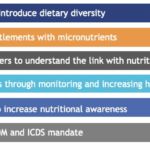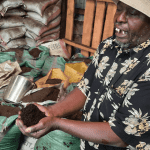A Roadmap to Food Security: Linking Geodata with Financial Inclusion to Support Smallholders
Achieving food security is one of the top priorities among the UN’s Sustainable Development Goals, and as the global demand for food continues to rise, the problem needs to be addressed before it is too late. Effective solutions must take into account the essential role played by smallholder farmers in emerging countries, who grow and produce a staggering 70 percent of the world’s food. There are approximately 500 million smallholder famers, of which 200 million produce for the market and operate in an agricultural value chain.
In working towards food security worldwide, it is important that these smallholder farmers increase their yields. However, access to financial services (input loans, working capital and investment finance) is one of the largest obstacles in realizing this. Numerous examples from all over the world show that geodata applications can improve agricultural production, assisting farmers with crop and yield monitoring, pest and disease management, and planning for potential droughts and other weather-related phenomena. Geodata can also boost financial access, which can help farmers further increase yields by buying inputs and fertilizers and investing in storage – among many other benefits. But currently, the use of geospatial information to improve the outreach and suitability of financial services to smallholder farmers has only been tested in a few cases and on a small scale.
Data Innovation for Inclusion
Allowing financial service providers (FSPs) to access geospatial data can make them better-informed and more involved in serving farmers as clients – and in turn, this will lead to a reduction of both costs and risks, and an increase in agricultural output. To help tap into these benefits, NpM’s Innovator’s Challenge brought together 17 companies to tackle the issue of geospatial data. Organized in cooperation with Rabobank, FMO, the Bill & Melinda Gates Foundation and Accenture, the Challenge culminated with six finalist companies that pitched their businesses at the Accenture Innovation Awards. Last month, three of the six enterprises were awarded the prize of €125,000 each to pilot test their initiatives. The Challenge was an example of applied open innovation, connecting different groups of people with the aim of solving a global social problem.
All participating tech companies were incentivized to transform their geodata-based solutions for smallholder farmers and make them available for the financial sector. The three winning solutions included:
Agri-Wallet and Geodatics, which will combine different sources of geodata, farmer profiles and crop growth models to provide effective, time and location-specific financial services to smallholders, and to lower transaction costs and financial risk for farmers, financial service providers (FSPs) and other value chain actors.
Apollo Agriculture, which will leverage agronomic machine learning, remote sensing technology and mobile phones to deliver the tools farmers need to increase their yields, along with the credit they need to afford these tools – without reliance on expensive, manual processes.
VanderSat, which will develop TARA, a risk assessment platform for FSPs that will use VanderSat’s unique, global satellite data, unobstructed by clouds, to give reliable climate and agricultural track records that are translated to quantified risk information on local crop conditions, farmer practices and climate coping capacity for smallholders.
The other three finalists who also pitched their solutions at the event were Alethiom, Financial Access/Satelligence and Impact Terra. Alethiom’s aim is to harness the power of geospatial data and drones to train satellite imagery to calculate smallholders’ yield at scale. Financial Access teamed up with Satelligence and developed an integrated solution to secure funding for farmers who are perceived to be the riskiest. And Impact Terra presented FARM, a web-designed, remote sensing and farmer data-powered solution for customer relationship and risk management.
Connecting the Geodata Dots
I genuinely believe the smallholder farming and financial inclusion sectors can find innovative solutions to the limitations that have hindered their collaboration. The technology that can enable these solutions is available, as we have made clear through the Challenge, and we have to take advantage of it. We need to establish the right partnerships that can make this collaboration successful.
NpM has chosen three promising solutions, each of which has the potential to be very impactful. We will closely follow the pilots that the three winners will carry out in the months to come, and we will share the lessons learned, so that others can use this information. We hope this will result in the establishment of new innovative approaches that better connect farmers and financial institutions through geodata-based tech solutions.
Josien Sluijs is Director of NpM, Platform for Inclusive Finance.
Photo provided by author.
Homepage photo: mariusz kluzniak, via Flickr.
- Categories
- Agriculture, Finance, Social Enterprise, Technology



